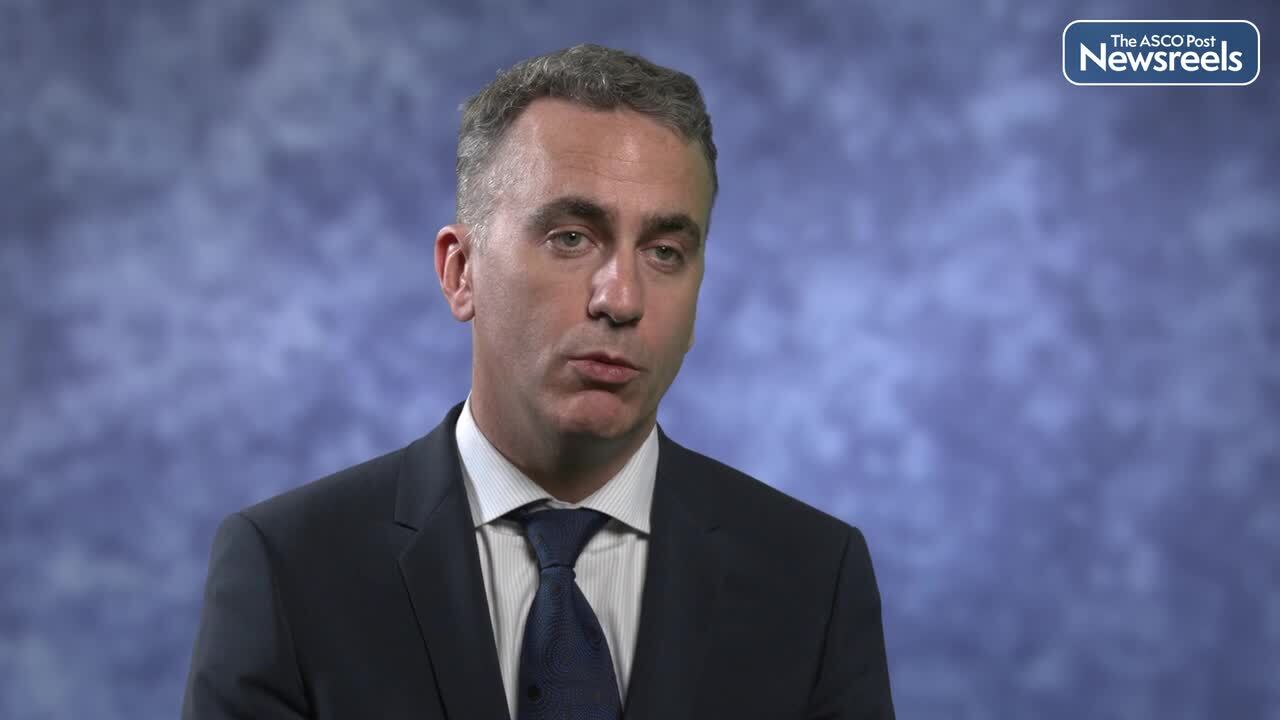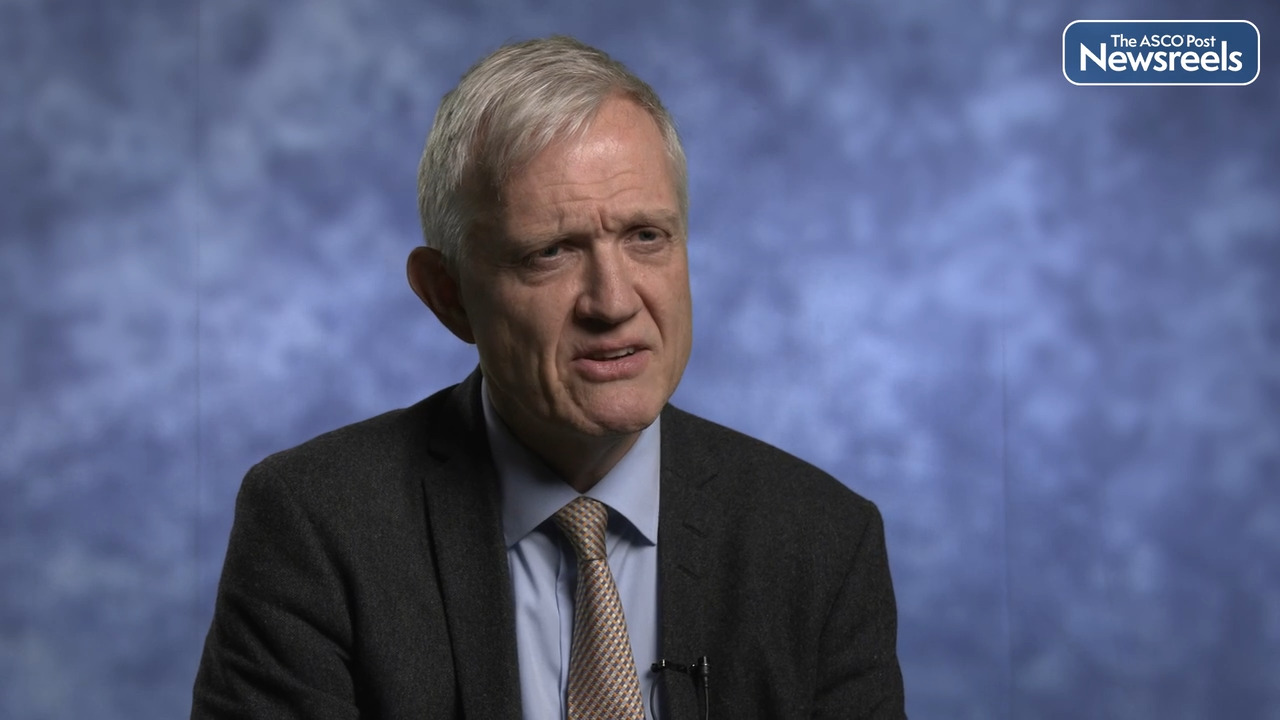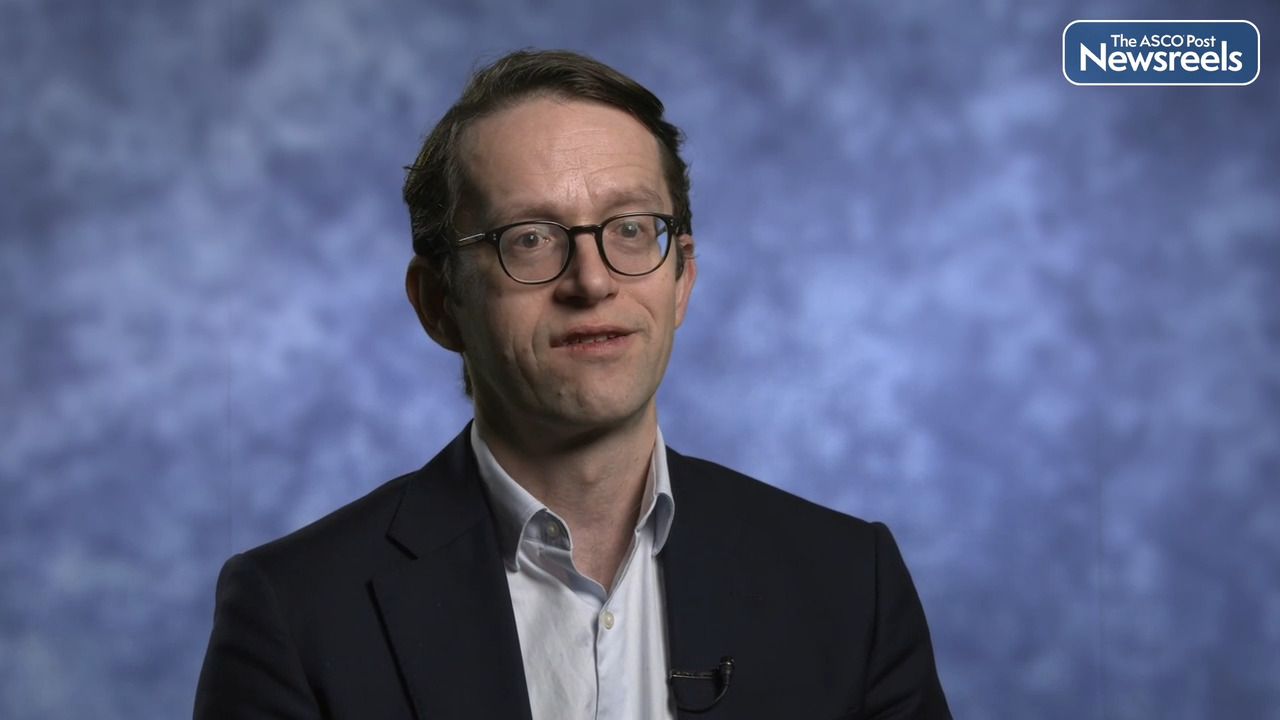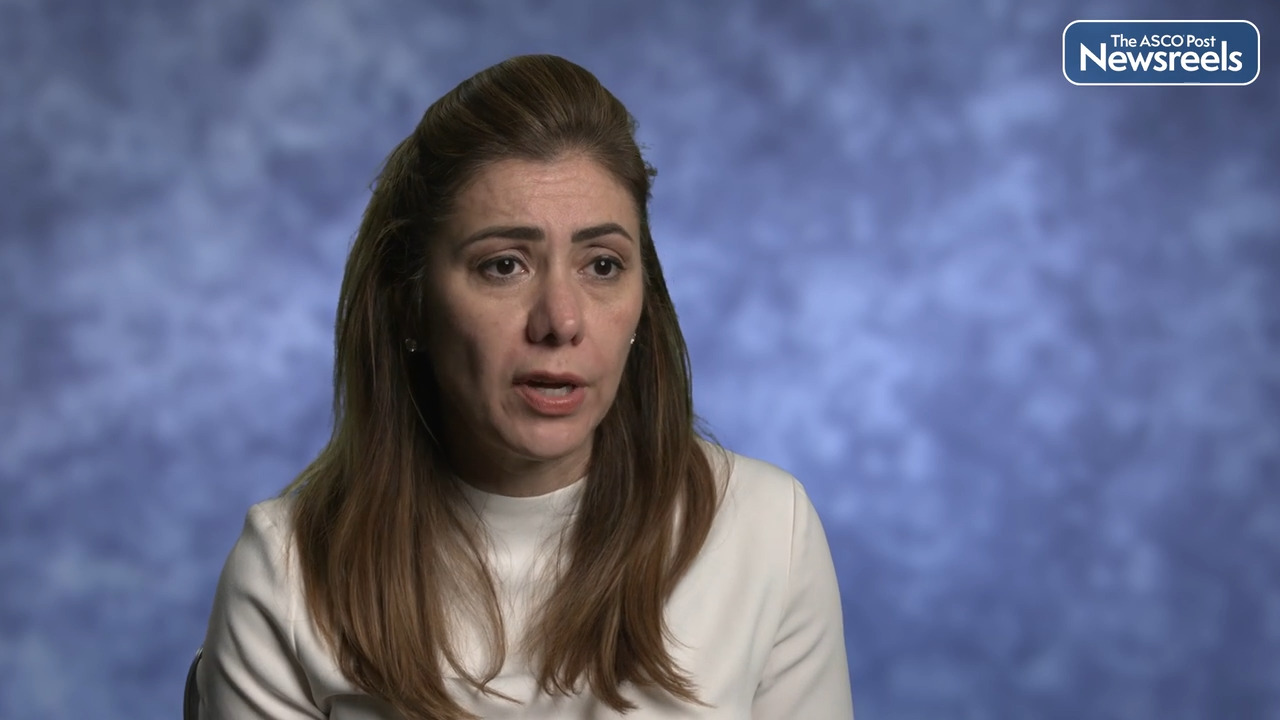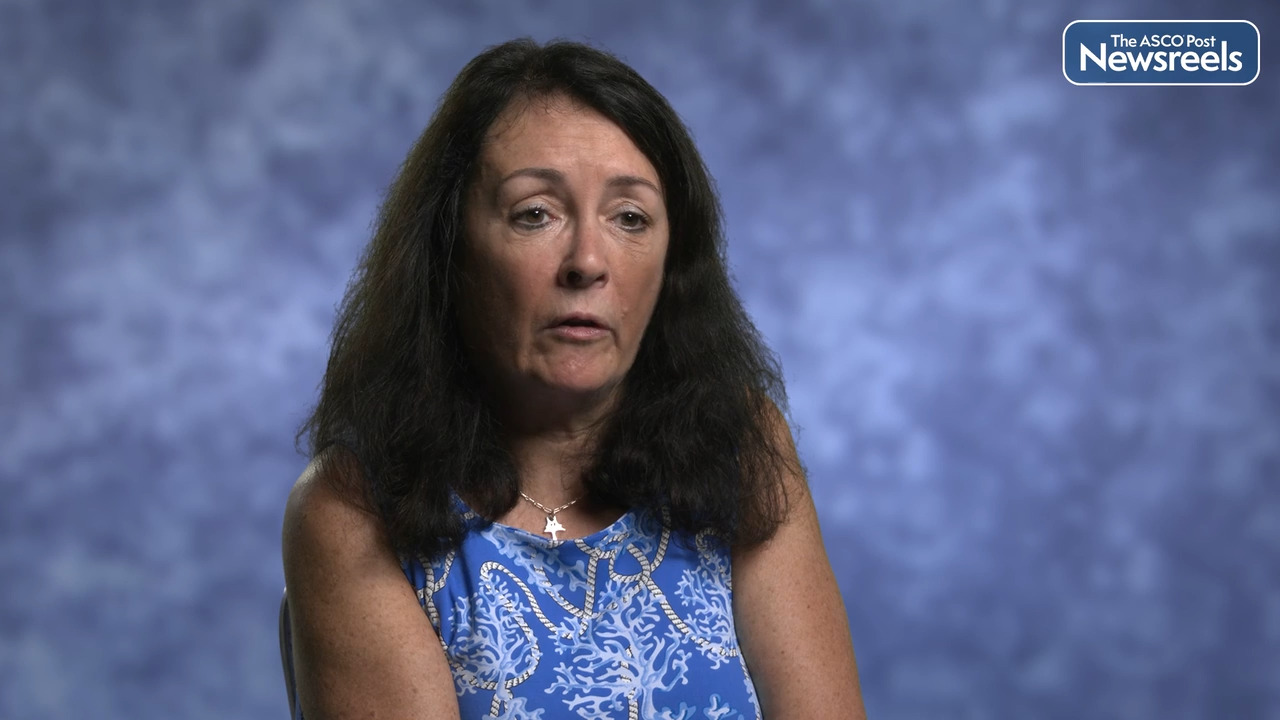Aditya Bardia, MD, MPH, on Elacestrant vs Standard-of-Care Endocrine Therapy in ER-Positive, HER2-Negative Breast Cancer
2022 San Antonio Breast Cancer Symposium
Aditya Bardia, MD, MPH, of Massachusetts General Hospital, discusses results from the phase III EMERALD trial, the first study to demonstrate improved progression-free survival vs standard of care in estrogen receptor (ER)-positive, HER2-negative metastatic breast cancer with one to two prior lines of endocrine treatment, with or without one line of chemotherapy. This finding applied to all patients in the study, including the subgroup with ESR1 mutations (Abstract GS3-01).
Transcript
Disclaimer: This video transcript has not been proofread or edited and may contain errors.
Endocrine therapy with a CDK4/6 inhibitor is the preferred first line treatment for patients with hormone receptor positive metastatic breast cancer, but patients eventually have disease progression. Endocrine resistance could be due to development of mutations in the estrogen receptor, the ESR1 mutations. In the second, third line setting we tend to use Fulvestrant as the endocrine therapy, but Fulvestrant is given as an intramuscular shot and different studies have shown that the duration of response, the median progression-free survival with Fulvestrant in the post-CDK4/6 setting is about two to three months, so clinically, there's an unmet need for better endocrine therapy options for patients with metastatic hormone receptor positive breast cancer.
The EMERALD trial was designed to look at a novel oral selective estrogen receptor degrader SERD called Elacestrant. It was compared with standard endocrine therapy Fulvestrant or choice of aromatase inhibitor depending on what patients received previously. If a patient had received AI plus a CDK4/6 in first line, in the second line setting they could receive Fulvestrant if randomized to the control arm.
The primary endpoint of the trial was progression-free survival in all patients. There was another primary endpoint which was progression-free survival in patients with ESR1 mutant hormone receptor positive metastatic breast cancer. As a reminder, this trial required patients to have received prior CDK4/6 inhibitor so it was in the post-CDK4/6 setting, second/third line setting.
At SABCS 2021 we saw the first results from the EMERALD trial, which demonstrated that Elacestrant was superior to standard of care endocrine therapy. At SABCS 2022 we saw updated results from the EMERALD trial stratified by the duration of prior CDK4/6 inhibitor. The key findings were that the duration of prior CDK4/6 inhibitor was associated with benefit from Elacestrant because if we look at the curves from the EMERALD trial, we see an initial drop and then separation of the curves in favor of Elacestrant. The question was can we identify the endocrine sensitive population because the initial drop is likely endocrine resistant, and then the separation is the endocrine sensitive population. It looks like the duration of prior CDK4/6 inhibitor can help identify the endocrine sensitive population.
For example, in all comers, the median progression-free survival in patients who had a prior CDK4/6 duration of at least 12 months, with Elacestrant the median PFS was close to six months versus about two months with standard endocrine therapy. This was even more pronounced in patients who had ESR1 mutant cancer, where the median PFS was more than eight months with Elacestrant versus about three months with standard endocrine therapy. So in summary, Elacestrant was superior to standard endocrine therapy in the second/third line setting for patients with hormone receptor positive metastatic breast cancer.
Prior duration of CDK4/6 inhibitor was associated with benefit with Elacestrant with a median PFS of more than eight months in patients with mutant ESR1 breast cancer. The drug was, in general, well tolerated. It's an oral drug. Majority of patients were able to continue Elacestrant without discontinuing because of side effects so it provides us an oral option for patients with metastatic hormone receptor positive breast cancer in the second/third line setting.
EMERALD looked at single agent Elacestrant versus standard endocrine therapy. There's a clinical trial called ELEVATE, which would look at Elacestrant in combination with other targeted therapies such as PI3 kinase inhibitor, mTOR inhibitor, CDK4/6 inhibitor. The ELEVATE trial would look at Elacestrant based combinations for patients with hormone receptor positive metastatic breast cancer.
Related Videos
The ASCO Post Staff
François-Clément Bidard, MD, PhD, of the Institut Curie, discusses overall survival results from the STIC CTC trial. To guide the choice between chemotherapy and endocrine therapy for patients with metastatic, estrogen receptor–positive/HER2-negative breast cancer, researchers compared circulating tumor cell (CTC) count to physician’s choice of treatment. The data suggest that the CTC count resulted in better long-term outcomes (Abstract GS3-09).
The ASCO Post Staff
Per Karlsson, MD, PhD, of Sweden’s University of Gothenburg and the Sahlgrenska Comprehensive Cancer Center, discusses results from the POLAR study, which was a meta-analysis of three clinical trials of breast-conserving surgery with or without radiotherapy. POLAR is the first genomic classifier that appears not only to be prognostic for locoregional recurrence, but also predictive of radiotherapy benefit. Although patients with breast cancer who had a high POLAR score benefited from radiotherapy, patients with a low score did not, and may be candidates for omission of radiotherapy after breast-conserving surgery (Abstract GS4-03).
The ASCO Post Staff
Nicholas C. Turner, MD, PhD, of London’s Institute of Cancer Research and The Royal Marsden, discusses phase III results from the CAPItello-291 clinical trial, which showed that in patients with hormone receptor–positive, HER2-negative tumors resistant to aromatase inhibitors, adding the investigational AKT inhibitor capivasertib to fulvestrant doubled the median progression-free survival compared with placebo plus fulvestrant (Abstract GS3-04).
The ASCO Post Staff
Mariana Chavez-MacGregor, MD, MSc, of The University of Texas MD Anderson Cancer Center, discusses phase III results from the SWOG S1207 trial which was designed to evaluate the role of adjuvant everolimus in combination with adjuvant endocrine therapy among patients with high-risk, hormone receptor–positive, HER2-negative early-stage breast cancer. Adding everolimus did not improve invasive disease–free or overall survival and was associated with high rates of adverse events (Abstract GS1-07).
The ASCO Post Staff
Ruth O’Regan, MD, of the University of Rochester Medical Center, discusses the Breast Cancer Index (BCI), a genomic assay that can assess the risk of late distant recurrence (5–10 years after diagnosis) of hormone receptor–positive, early-stage breast cancer. Among premenopausal women with this disease who were enrolled in the SOFT trial, those with a high BCI score had an increased risk of distant recurrence. Those with a low BCI score benefited more from the addition of ovarian suppression therapy to endocrine therapy after 12 years of follow-up (Abstract GS1-06).
